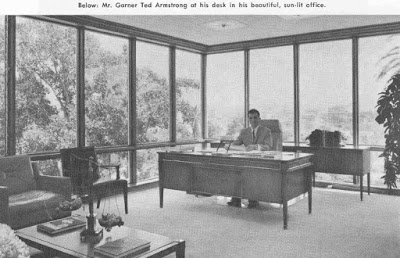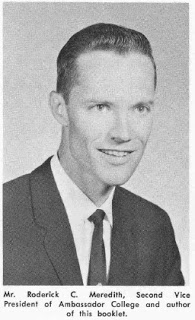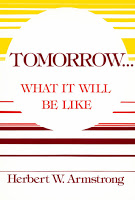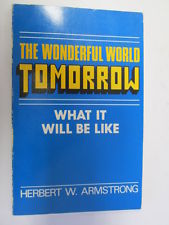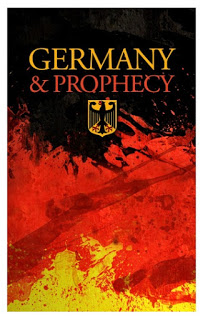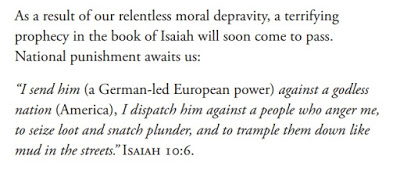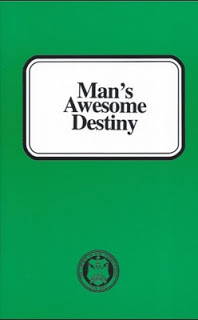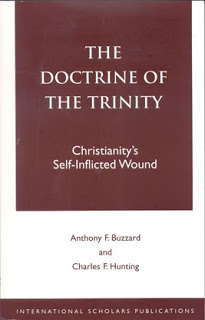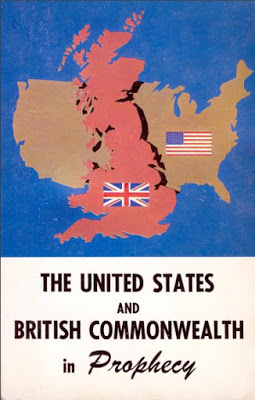Ian Boyne is one of the most approachable and thoughtful advocates for Armstrongism today (he refers to it Reformed Armstrongism). I really appreciate his willingness to engage those of us who are of a more jaundiced disposition, something which is in my experience extremely rare. Even when the language on this side of the fence gets overly strident, Ian seems to maintain his composure. He serves in one of the more benign COGs, the Church of God International, a movement with which I was once briefly associated myself "in the high and far-off times". Moreover, Ian is widely read in a way that is quite exceptional for COG ministers.
Ian recently issued something of a challenge. The gist of it was - and I hope I'm getting this right - that the shining thread that inspires the followers of Herbert Armstrong today isn't BI, but the concept of human destiny in the family of God. Here we find purpose and direction for our lives.
"[Herbert Armstrong] taught the glorious truth not found in any New Covenant church that all saved human beings of ALL RACES would become, equally, God beings after the millennium and the Great White Throne judgment. If you want to see a robust defense of that doctrine, I invite you to read my short booklet online Man's Awesome Destiny... It was published by CGI [and it] does not regurgitate HWA's Why Were You Born. I would be gleeful if Byker Bob, Gavin or Gary would read and critique it. I would be over the moon!"
The booklet can be found in PDF format here. I don't intend to go through it in detail, so doubt Ian will get all the way to the moon on this trip, but am happy to offer a few comments. I confess that it was this WCG teaching, certainly not BI, that appealed most to my teenage self, a real contrast to the rather dry trinitarianism that was drummed in during Lutheran confirmation classes (using a text with the magnificent title
Catechetical Helps).
Right at the outset let's put the idea of
theosis on the table.
"Theosis is the understanding that human beings can have real union with God, and so become like God to such a degree that we participate in the divine nature" (
Mark Shuttleworth). This is an entirely legitimate understanding of human destiny for those in the Eastern Orthodox tradition. You could argue that Armstrong adopted this position, then ran off with it adding in his own unique spin, but I think it's more likely that he simply adapted parts of Mormon doctrine. But regardless, the idea that humans can become divine isn't in itself such a big issue.
Ian's booklet delves into apologetics quite quickly, discussing "the Anthropic Principle" (I'm not sure why he capitalises it). The idea is that everything in the universe is purpose-built for life. It's an expansion of "the Goldilocks principle" (that planet earth is designed to be "just right" for humanity). Ian states,
"The evidence for it is simply overwhelming." Not so overwhelming, though, that it isn't highly contested. The relevance of this to the core argument Ian is proposing seems a bit tangential to me. I guess the reason for introducing it into the discussion is to demonstrate that a wonderful human destiny is indicated by intelligent design. I'm of the opinion that there is a certain circularity to this line of thinking, but what do I know? If you're interested, there's a much smarter discussion of the anthropic principle than I could ever offer over at
the University of Oregon website.
Ian loses me, though, when he makes an impassioned call for his readers to drop to their knees:
"Could you please, at this point, stop reading and pray... Conviction of truth comes through the Holy Spirit... Pray now for God's divine guidance on this subject." Well, okay, but I don't think this necessarily bolsters his case. We all know people who pray an awful lot but still believe all kinds of nonsense.
For some of us the statement
"If Jesus is not God, then man cannot be God" rather ruins the argument. WCG always had a very mixed Christology, reaching a crescendo of confusion with Ted Armstrong's
The Real Jesus, and I'd personally want to step away from any full-blown binitarianism. I'm not saying that Ian is wrong, only that this logic only works from a certain perspective. Former Ambassador College faculty member Sir Anthony Buzzard plays the game equally well and confidently arrives at a type of biblical unitarianism (see for example
The Doctrine of the Trinity: Christianity's Self-Inflicted Wound, co-authored with former WCG evangelist Charles Hunting) .
Ian rolls out a selection of texts to bolster his case, as you'd expect. I note that he includes 1 Peter (
"In 1 Peter 5:10 we have the unmistakable words from the pen of inspiration") and Colossians. The trouble is that Colossians is not counted among the authentic letters of Paul, nor 1 Peter regarded as from the hand of Peter. At best they form a second line of defense in any credible academic discussion. During my studies, I remember being assigned a very thick textbook on the Ephesian church (Paul Trebilco's
The Early Christians in Ephesus from Paul to Ignatius) in which the author studiously avoided using the book of Ephesians because of its contested authorship. Curated proof texts of this sort are inadequate to a serious discourse, something I expect Ian would agree with in discussing the Buzzard and Hunting book. I like the fact that Ian includes a short discussion of 'weak texts' which don't support the weight of the argument.
To summarise,
Man's Awesome Destiny is an interesting and in some respects quite original defense of the God Family doctrine. Ian distances himself from the more extreme statements, but I'm of the view that he weakens his argument at several points exactly where he seeks to strengthen it. If we were discussing a non-trinitarian understanding of theosis, one not intermixed with extraneous elements and rhetorical flourishes, then I might be prepared to concede a point here and there.
You can judge the merits of Ian's booklet for yourself. As for me, I suspect that the real meaning of life lies in the meaning we bring to life.
(Update: clarification added in the paragraph about 1 Peter).




